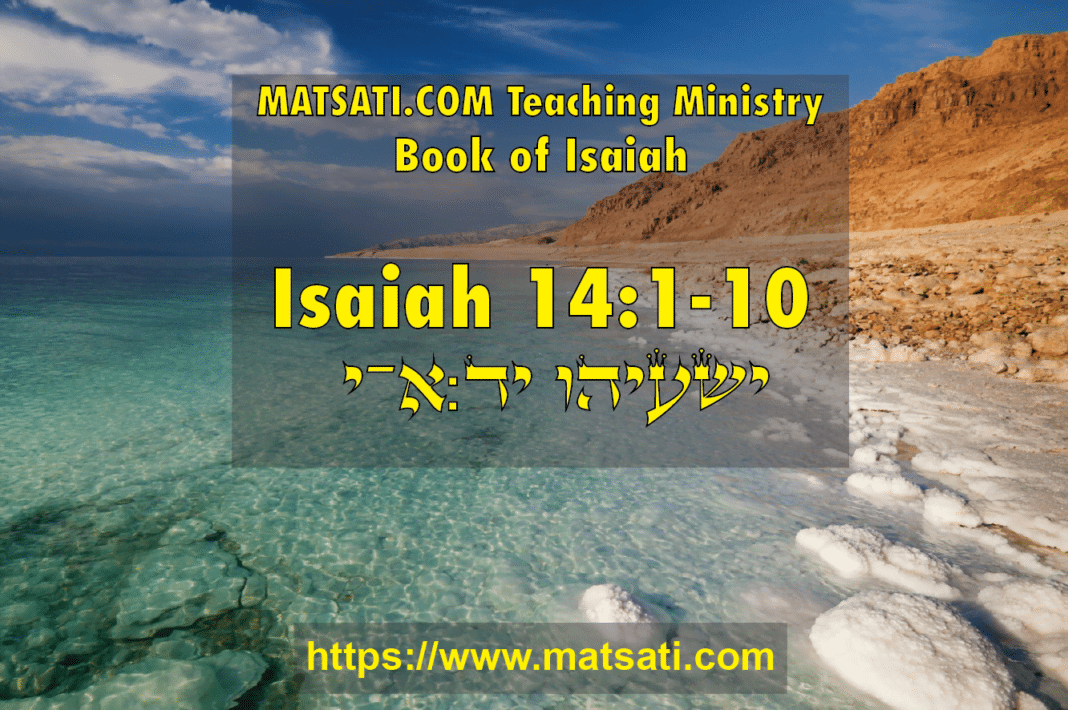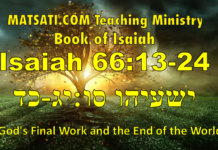Table of Contents
Introduction to Isaiah 14:1-10
In Isaiah 14:1-23 we read about the downfall of the king of Babylon. Here we find Isaiah writing a song concerning the downfall of the king according to verses 14:4-21. We note that since the chapter is within the context of chapter 13, and regarding what is written in Isaiah 14:4, Isaiah states explicitly מֶלֶךְ בָּבֶל “king of Babylon” but does not provide the name of the king. The song describes the destruction of lofty pride and arrogance, the very thing that the Lord God is chastising Israel, Judah, and Jerusalem concerning their pride and refusal to listen to His voice. We note that the ultimate plane for mankind (Jew and Gentile) is for his redemption as Isaiah describes in Isaiah 2, and 11:11-16 and provide a blessing to all the world as God had spoken prophetically through Isaiah (11:1-9) and through Abraham (Bereshit / Genesis 12:2-3, 18:17-18). The wrath of God is directed towards the destruction of sin, and all men, women, and children, have the option to seek the God of Israel and His Messiah Yeshua and not receive the wrath of God. Seeking the God of Israel and His Anointed One we receive the mercy and grace of God through forgiveness and redemption from sin. Isaiah in his book does not speak just on destruction but of hope and life that is found in the Lord God Almighty! Because of Israel, Judah, and Jerusalem pride, they would rather trust in themselves as opposed to trusting in God, and so remaining in their bondage to sin the majority will reap destruction. The Lord God Almighty however because of His faithfulness will not forsake His people (see Isaiah 50:1-3, Ezekiel 36:32-36, Hosea 11:8-11, and Micah 7:8-10). The ultimate goal for the delay of their destruction is the Lord allowing time for repentance. The Lord God delays his answers to allow time for conviction, confession, and repentance. Sometimes, sin prevents answers to our prayers (Tehillim / Psalm 66:18) as Daivd wrote according to His Psalm. The Lord God is gracious and merciful waiting patiently for us (2 Peter 3:8-9). The Lord sometimes also delays his answers to our requests so that His glory is maximized in our lives and our present situation (see John 11:1-4). Isaiah opens chapter 14 saying the following:
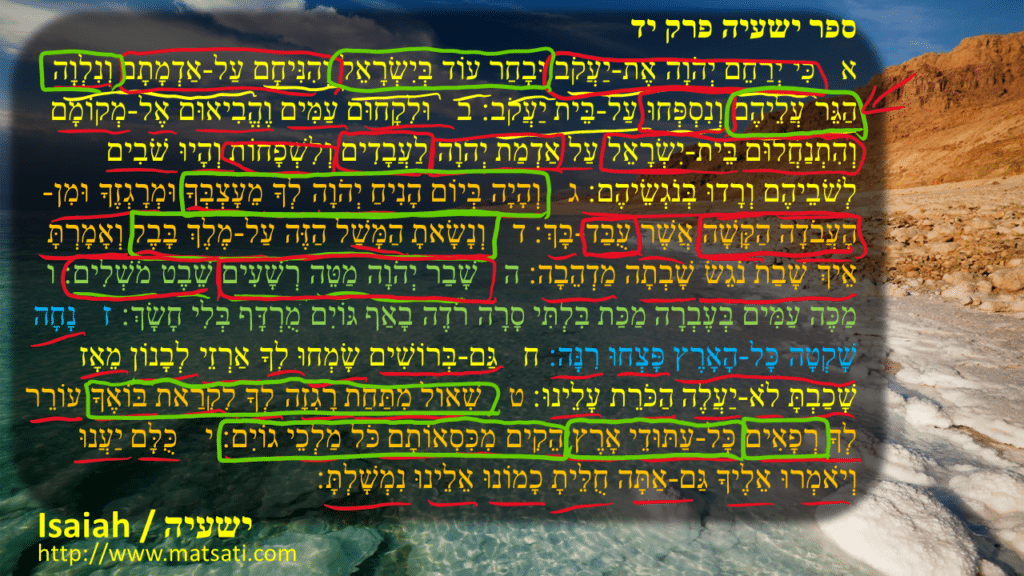
ספר ישעיה פרק יד
א כִּי יְרַחֵם יְהֹוָה אֶת-יַעֲקֹב וּבָחַר עוֹד בְּיִשְֹרָאֵל וְהִנִּיחָם עַל-אַדְמָתָם וְנִלְוָה הַגֵּר עֲלֵיהֶם וְנִסְפְּחוּ עַל-בֵּית יַעֲקֹב: ב וּלְקָחוּם עַמִּים וֶהֱבִיאוּם אֶל-מְקוֹמָם וְהִתְנַחֲלוּם בֵּית-יִשְֹרָאֵל עַל אַדְמַת יְהֹוָה לַעֲבָדִים וְלִשְׁפָחוֹת וְהָיוּ שֹׁבִים לְשֹׁבֵיהֶם וְרָדוּ בְּנֹגְשֵֹיהֶם:
Isaiah 14:1 states, “For the LORD will have mercy on Jacob, and will yet choose Israel, (כִּי יְרַחֵם יְהֹוָה אֶת-יַעֲקֹב וּבָחַר עוֹד בְּיִשְֹרָאֵל) and set them in their own land: and the strangers shall be joined with them, and they shall cleave to the house of Jacob. (וְהִנִּיחָם עַל-אַדְמָתָם וְנִלְוָה הַגֵּר עֲלֵיהֶם וְנִסְפְּחוּ עַל-בֵּית יַעֲקֹב)” Isaiah 14:2 “And the people shall take them, and bring them to their place: (וּלְקָחוּם עַמִּים וֶהֱבִיאוּם אֶל-מְקוֹמָם) and the house of Israel shall possess them in the land of the LORD for servants and handmaids: (וְהִתְנַחֲלוּם בֵּית-יִשְֹרָאֵל עַל אַדְמַת יְהֹוָה לַעֲבָדִים וְלִשְׁפָחוֹת) and they shall take them captives, whose captives they were; and they shall rule over their oppressors. (וְהָיוּ שֹׁבִים לְשֹׁבֵיהֶם וְרָדוּ בְּנֹגְשֵֹיהֶם)” Note what Isaiah states according to Isaiah 14:1, that God will have mercy on Jacob יְרַחֵם יְהֹוָה אֶת-יַעֲקֹב where Jacob is a reference to all of Israel. And the significance of וְנִלְוָה הַגֵּר עֲלֵיהֶם “strangers being joined to them.” These are gentiles (non-Jews) who love the Lord God of Israel and join themselves with Israel. This speaks to the mercy of God and the truthfulness of Isaiah’s words according to Isaiah 2:1-5. Isaiah speaks of a future hope and the Lord’s compassion on all men! Again, the Lord is remembering not just His people Israel, but all peoples have the opportunity to seek the God of Israel and be redeemed by His great might! This idea וּבָחַר עוֹד בְּיִשְֹרָאֵל “and yet will choose Israel” suggests that due to their sins one currently is not chosen. Remember that this is a reference to those who are unrepentant and refuse to listen to the voice of God. It is for this reason Isaiah speaks of Babylon as the oppressor who will destroy Judah and Jerusalem. We do read according to Jeremiah that there remained a remnant of people. But even in the midst of Jeremiah’s fulfilled words, and the people who remained living in safety, they sill were rebellious and suffered punishment. (see Last few chapters of book of Jeremiah) The point is regarding the Faithfulness of God that He had heard Israel’s suffering and delivered her from bondage in Egypt, He will deliver Israel again in Mesopotamia. (Devarim / Deuteronomy 4:37, 7:6-7, Tehillim / Psalms 135:4) The choosing is about God’s promises. We note the national revival to return to the Land of Israel and rebuild / restore the Temple. The Lord God works in their hearts to do these things. This is something that we should be looking for in our lives, the Lord working. This is God’s choice that we should bear His testimonies before the world. This draws us back to the Torah context of the covenant promises to Abraham. Here Isaiah states that the gentiles will also partake in the blessings just as God had promised Abraham in Beteshit / Genesis 12:1-4.
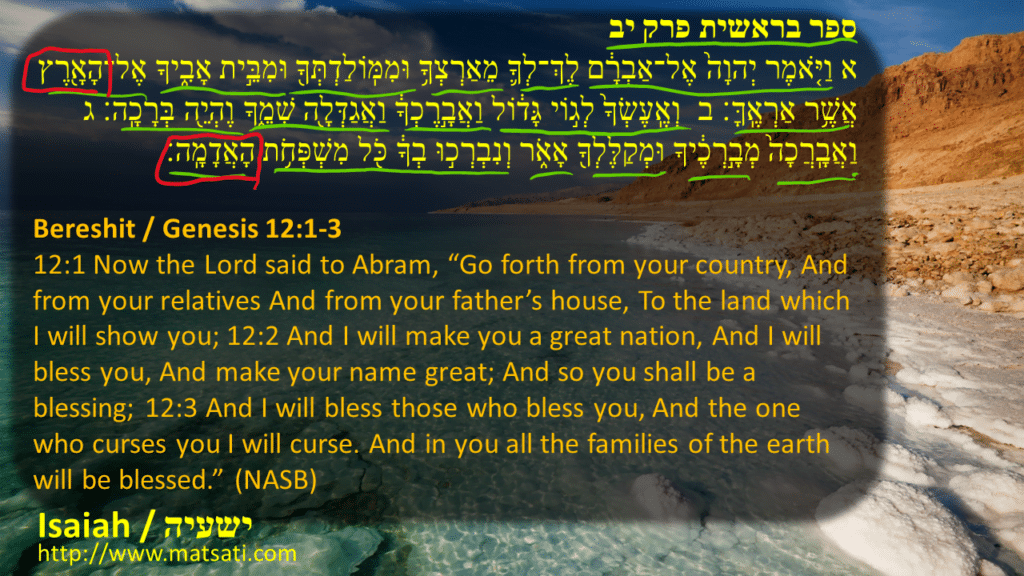
ספר בראשית פרק יב
א וַיֹּ֤אמֶר יְהוָה֙ אֶל־אַבְרָ֔ם לֶךְ־לְךָ֛ מֵאַרְצְךָ֥ וּמִמּֽוֹלַדְתְּךָ֖ וּמִבֵּ֣ית אָבִ֑יךָ אֶל־הָאָ֖רֶץ אֲשֶׁ֥ר אַרְאֶֽךָּ׃ ב וְאֶֽעֶשְׂךָ֙ לְג֣וֹי גָּד֔וֹל וַאֲבָ֣רֶכְךָ֔ וַאֲגַדְּלָ֖ה שְׁמֶ֑ךָ וֶהְיֵ֖ה בְּרָכָֽה׃ ג וַאֲבָֽרֲכָה֙ מְבָ֣רְכֶ֔יךָ וּמְקַלֶּלְךָ֖ אָאֹ֑ר וְנִבְרְכ֣וּ בְךָ֔ כֹּ֖ל מִשְׁפְּחֹ֥ת הָאֲדָמָֽה׃
Bereshit / Genesis 12:1-3
12:1 Now the Lord said to Abram, “Go forth from your country, And from your relatives And from your father’s house, To the land which I will show you; 12:2 And I will make you a great nation, And I will bless you, And make your name great; And so you shall be a blessing; 12:3 And I will bless those who bless you, And the one who curses you I will curse. And in you all the families of the earth will be blessed.” (NASB)
We note that God chooses whom he pleases, and the choice is based upon the character of the generation of people or the individual. The idea here is to be intentional in actively seeking the Lord. The continual choosing of God reveals to us His great love. The idea of הַגֵּר joining themselves to Israel is co aistent with Isaiah prophecy according to Isaiah 2:1-3, 60:1-3, and 61:5-7. It is interesting that John Oswalt considers הַגֵּר as reducing the gentiles to slaves. This however is far from the truth. Note the following references to the Torah regarding הַגֵּר “the stranger.”
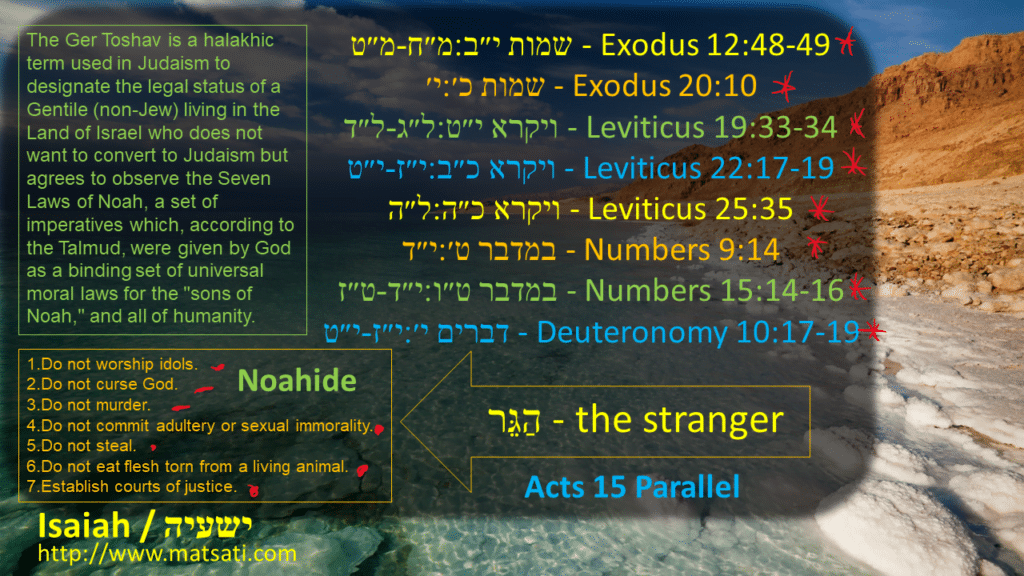
שמות י״ב:מ״ח-מ״ט Exodus 12:48-49
שמות כ׳:י׳ Exodus 20:10
ויקרא י״ט:ל״ג-ל״ד Leviticus 19:33-34
ויקרא כ״ב:י״ז-י״ט Leviticus 22:17-19
ויקרא כ״ה:ל״ה Leviticus 25:35
במדבר ט׳:י״ד Numbers 9:14
במדבר ט״ו:י״ד-ט״ז Numbers 15:14-16
דברים י׳:י״ז-י״ט Deuteronomy 10:17-19
The Ger Toshav is a halakhic term used in Judaism to designate the legal status of a Gentile (non-Jew) living in the Land of Israel who does not want to convert to Judaism but agrees to observe the Seven Laws of Noah, a set of imperatives which, according to the Talmud, were given by God as a binding set of universal moral laws for the “sons of Noah,” and all of humanity. The seven commandments of the Noahic Covenant to which the ger toshav agrees to be bound are enumerated in the Babylonian Talmud (Avodah Zarah 8:4, Sanhedrin 56a-b).
- Do not worship idols.
- Do not curse God.
- Do not murder.
- Do not commit adultery or sexual immorality.
- Do not steal.
- Do not eat flesh torn from a living animal.
- Establish courts of justice.
The Encyclopedia Talmudit, edited by rabbi Shlomo Yosef Zevin, states that after the giving of the Torah, the Jewish people were no longer included in the category of the sons of Noah; however, Maimonides (Mishneh Torah, Hilkhot M’lakhim 9:1) indicates that the seven commandments are also part of the Torah, and the Babylonian Talmud (Sanhedrin 59a, see also Tosafot) states that Jews are obligated in all things that Gentiles are obligated in, albeit with some differences in the details. According to the Encyclopedia Talmudit, most medieval Jewish authorities considered that all the seven commandments were given to Adam, although Maimonides (Mishneh Torah, Hilkhot M’lakhim 9:1) considered the dietary law to also have been given to Noah. According to the Torah, the Gerim (stranger) must rest on Shabbat, exactly like Jews (Shemot / Exodus 20:10, 23:12). Gerim may collect the gleanings (leket) from the field, alongside poor Israelites (Vayikra / Leviticus 23:22). Gerim must be treated equally in a court of law (Devarim / Deuteronomy 1:16, Vayikra / Leviticus 24:22, Bamidbar / Numbers 35:15). Gerim may eat from the tithe exactly like the widow and the orphan (Devarim / Deuteronomy 14:29). Gerim who are day laborers may not be abused. You must pay them their wages on the same day (Devarim / Deuteronomy 24:14-15). Gerim must not eat chametz during Pesach (Shemot / Exodus 12:19). Gerim must “afflict their souls” and refrain from work on Yom Kippur (Vayikra / Leviticus 16:29). Gerim must not worship other Gods (Vayikra / Leviticus 17:8-9). Gerim must not eat blood, just like Israelites (Vayikra / Leviticus 17:10). Leviticus 18 lists an entire series of sexual prohibitions and concludes that they apply both to the citizen and to the ger (Vayikra / Leviticus 18:26). Gerim may not sacrifice their children to Molech (Vayikra / Leviticus 20:1-5). Gerim may not curse God (Vayikra / Leviticus 24:16). Gerim who become ritually impure must be purified (Bamidbar / Numbers 19:10). Gerim may not commit murder (Bamidbar / Numbers 35:15). The way the Torah and the rabbinic literature lists the place of the ger (stranger) he is not being reduced to a slave! The status of the Ger is in fact very high according to Avodah Zarah 64b:7-9 and Bava Kamma 38a:11-12.
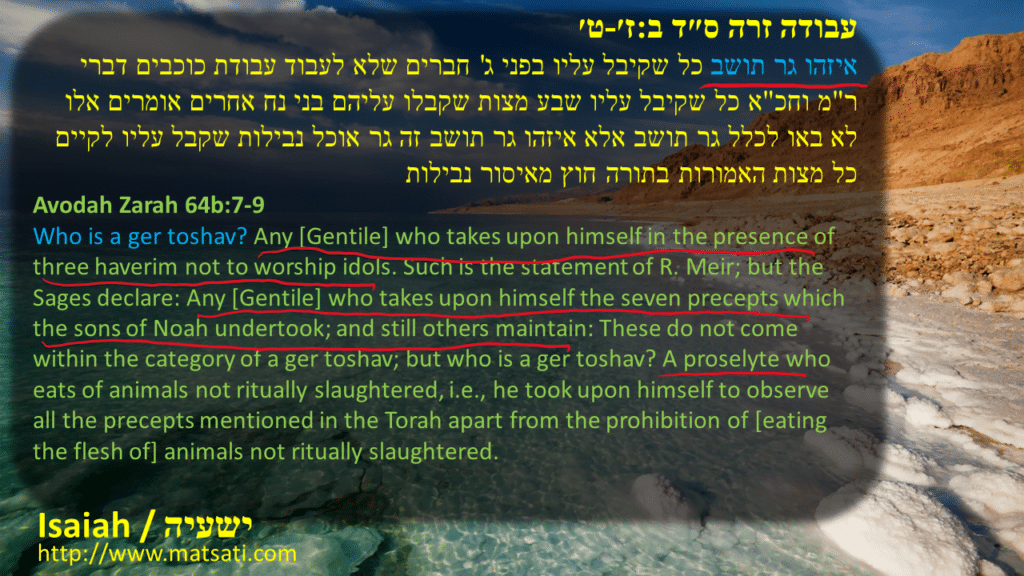
עבודה זרה ס״ד ב:ז׳-ט׳
איזהו גר תושב כל שקיבל עליו בפני ג’ חברים שלא לעבוד עבודת כוכבים דברי ר”מ וחכ”א כל שקיבל עליו שבע מצות שקבלו עליהם בני נח אחרים אומרים אלו לא באו לכלל גר תושב אלא איזהו גר תושב זה גר אוכל נבילות שקבל עליו לקיים כל מצות האמורות בתורה חוץ מאיסור נבילות
Avodah Zarah 64b:7-9
Who is a ger toshav? Any [Gentile] who takes upon himself in the presence of three haverim not to worship idols. Such is the statement of R. Meir; but the Sages declare: Any [Gentile] who takes upon himself the seven precepts which the sons of Noah undertook; and still others maintain: These do not come within the category of a ger toshav; but who is a ger toshav? A proselyte who eats of animals not ritually slaughtered, i.e., he took upon himself to observe all the precepts mentioned in the Torah apart from the prohibition of [eating the flesh of] animals not ritually slaughtered.
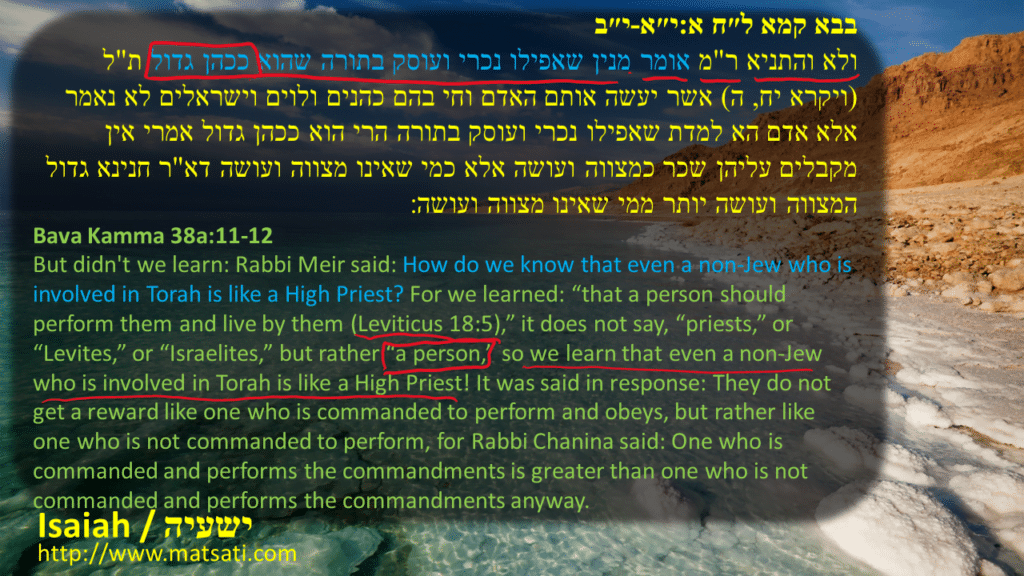
בבא קמא ל״ח א:י״א-י״ב
ולא והתניא ר”מ אומר מנין שאפילו נכרי ועוסק בתורה שהוא ככהן גדול ת”ל (ויקרא יח, ה) אשר יעשה אותם האדם וחי בהם כהנים ולוים וישראלים לא נאמר אלא אדם הא למדת שאפילו נכרי ועוסק בתורה הרי הוא ככהן גדול אמרי אין מקבלים עליהן שכר כמצווה ועושה אלא כמי שאינו מצווה ועושה דא”ר חנינא גדול המצווה ועושה יותר ממי שאינו מצווה ועושה:
Bava Kamma 38a:11-12
But didn’t we learn: Rabbi Meir said: How do we know that even a non-Jew who is involved in Torah is like a High Priest? For we learned: “that a person should perform them and live by them (Leviticus 18:5),” it does not say, “priests,” or “Levites,” or “Israelites,” but rather “a person,” so we learn that even a non-Jew who is involved in Torah is like a High Priest! It was said in response: They do not get a reward like one who is commanded to perform and obeys, but rather like one who is not commanded to perform, for Rabbi Chanina said: One who is commanded and performs the commandments is greater than one who is not commanded and performs the commandments anyway.
Note the status of the ger who studies Torah, he is like the Cohen Hagadol (High Priest). The Torah actually makes it clear the stranger (ger) was not a slave, and that these passages do not need to be spiritualized to understand them. The major problem is a lack of understanding the Torah and the Rabbis. These things reveal to us how God has a plan for both the Jew and the Gentile to draw near to him, just as we read in Isaiah 2:1-3. Isaiah continues saying the following:
ספר ישעיה פרק יד
ג וְהָיָה בְּיוֹם הָנִיחַ יְהֹוָה לְךָ מֵעָצְבְּךָ וּמְרָגְזֶךָ וּמִן-הָעֲבֹדָה הַקָּשָׁה אֲשֶׁר עֻבַּד-בָּךְ: ד וְנָשָֹאתָ הַמָּשָׁל הַזֶּה עַל-מֶלֶךְ בָּבֶל וְאָמָרְתָּ אֵיךְ שָׁבַת נֹגֵשֹ שָׁבְתָה מַדְהֵבָה:
Isaiah 14:3 states, “And it shall come to pass in the day that the LORD shall give thee rest from thy sorrow, (וְהָיָה בְּיוֹם הָנִיחַ יְהֹוָה לְךָ מֵעָצְבְּךָ) and from thy fear, and from the hard bondage wherein thou wast made to serve, (וּמְרָגְזֶךָ וּמִן-הָעֲבֹדָה הַקָּשָׁה אֲשֶׁר עֻבַּד-בָּךְ)” Isaiah 14:4 “That thou shalt take up this proverb against the king of Babylon, (וְנָשָֹאתָ הַמָּשָׁל הַזֶּה עַל-מֶלֶךְ בָּבֶל) and say, How hath the oppressor ceased! the golden city ceased! (וְאָמָרְתָּ אֵיךְ שָׁבַת נֹגֵשֹ שָׁבְתָה מַדְהֵבָה)” Isaiah states that the Lord God will give His people rest. We also read the beginning of a proverb against the king of Babylon according to Isaiah 14:3. (The entire proverb spans Isaiah 14:4-21.) We note how the Lord God will show kindness to those who humble themselves, as opposed to those who are proud and arrogant and exalt themselves. The rest that God promises are to those who are faithful, and this rest will be in their own land. (see Devarim / Deuteronomy 12:9, 2 Samuel 7:1, 1 Kings 8:56, Isaiah 28:12, 32:18, Tehillim / Psalms 95:1, Micca 2:10) The Scriptures also promise that it is the Lord God Almighty who goes before us to destroy our enemies, and those who would lord authority over us in an oppressive manner. Isaiah does not specifically identify the specific king of Babylon. The reason may be that every king was proud and arrogant before God in heaven! The Lord God is sending the armies to end prideful men in Israel, Judah, and Jerusalem, He will also do these things to the nation that He uses to bring judgment upon the rebellious people. John Oswalt states that “None of the kings of the Neo-Babylonian empire (e.g., Nebuchadrezzar or Nabonidus) fits, nor do any of the Assyrian kings of Isaiah’s day (Sargon II or Sennacherib), although the latter kings certainly aroused the same kinds of hatred among the people that this poem describes. That Tiglath-pileser as well as Sargon and Sennacherib styled themselves as ‘kings of Babylon’ would make it easier for Isaiah to have patterned his representative figure after these great tyrants, but there is no indication that he has one particular person in mind.” So, the idea is that the song may be from a more generalized sense referring to those who are proud and in leadership positions. This is an important point as we continue in the song and look specifically at Isaiah 14:12.
ספר ישעיה פרק יד
ה שָׁבַר יְהֹוָה מַטֵּה רְשָׁעִים שֵׁבֶט מֹשְׁלִים: ו מַכֶּה עַמִּים בְּעֶבְרָה מַכַּת בִּלְתִּי סָרָה רֹדֶה בָאַף גּוֹיִם מֻרְדָּף בְּלִי חָשָֹךְ:
Isaiah 14:5 states, “The LORD hath broken the staff of the wicked, and the sceptre of the rulers. (שָׁבַר יְהֹוָה מַטֵּה רְשָׁעִים שֵׁבֶט מֹשְׁלִים)” Isaiah 14:6 “He who smote the people in wrath with a continual stroke, (מַכֶּה עַמִּים בְּעֶבְרָה מַכַּת בִּלְתִּי) he that ruled the nations in anger, is persecuted, and none hindereth. (רֹדֶה בָאַף גּוֹיִם מֻרְדָּף בְּלִי חָשָֹךְ)” The staff is also known as the crosier. In ancient Egypt, the significance of the Egyptian Staff has multiple meanings that are tied to their religious practice and worship of their gods. The Egyptian staff, also called “Heqa or Heq scepter,” is a symbol of divine power and a symbol of authority. The symbolic Egyptian staff depicts a ceremonial staff whose fork-shaped end and animal-like head are usually placed together with ankh or in the hands of a god (usually Set or Anubis). It represents domination and power and is also considered responsible for caring for the dead; it is often used as a burial device. A real scepter made of wood or earthenware was also discovered. The “was” symbol stands for ceremonial personnel and is usually displayed with the ankh. The Babylonian crosier or staff is not as well described, and many resources are found when performing an internet search. The crosier is described as a serpent crosier that is related to baal (sun god) worship. So, the point if when Isaiah states, שָׁבַר יְהֹוָה מַטֵּה רְשָׁעִים שֵׁבֶט מֹשְׁלִים “The LORD hath broken the staff of the wicked, and the scepter of the rulers” there are many levels to what the Lord God in heaven is doing. He is destroying not just their pride, but also their trust in their gods. The Lord is demonstrating His authority and power of these false gods. These comments concerning the earthly kingdoms, the connection to the crosiers of the rulers and their religions practice which they trust, this draws in a spiritual aspect of the terribleness of these false religious practices (moloch, baal, ashtoreth, etc) which is depicted in their rituals of human sacrifice. There is an utter detestable contempt for these religious practices which do not have a sanctity for human life. This is paralleled to the one who was hurled out of heaven to earth (Isaiah 14:12), and how God is all powerful, that none can stand before him in his pride. All will be humbled, no matter how powerful a man or spiritual being may be. These things teach us that the destruction of our enemies will come by the hand of God, and so we do not need to worry, all we need to do is trust in the Lord God in heaven and in His Messiah Yeshua! (See Revelation 19:1-8) John Oswalt states, “The picture here of unceasing and relentless oppression accords very well with the claims of the Assyrian kings. In their annals they report at great length the violence and the unwavering nature of their assaults upon their neighbors. If we accept their word, they mastered the technique of ruling through terror. The blows which would come upon anyone who dared to dissent from Assyrian domination were so massive and so total that nation after nation was cowed into submission.” The idea then that is found in these verses Isaiah is saying the Lord is able and powerful to destroy such nations and those who do such things. The Lord God in heaven is more powerful than these nations, he is able to destroy not just their pride, but their power, their fear, and even their false gods in whom they trust! This is the point that Isaiah is trying to make, if only God’s people would trust in Him, relying upon His mercy, and His authority over all nations, then peace would come at the hand of God and His Messiah!
ספר ישעיה פרק יד
ז נָחָה שָׁקְטָה כָּל-הָאָרֶץ פָּצְחוּ רִנָּה:
Isaiah 14:7 states, “The whole earth is at rest, and is quiet: they break forth into singing. (נָחָה שָׁקְטָה כָּל-הָאָרֶץ פָּצְחוּ רִנָּה)” It is interesting how Isaiah says נָחָה שָׁקְטָה כָּל-הָאָרֶץ “all the earth is at rest.” The entire world being at rest and giving praise, this seems to suggest the Lord delivering the earth and then the inhabitants giving praise. It is interesting in the next verse the trees are also giving praise.
ספר ישעיה פרק יד
ח גַּם-בְּרוֹשִׁים שָֹמְחוּ לְךָ אַרְזֵי לְבָנוֹן מֵאָז שָׁכַבְתָּ לֹא-יַעֲלֶה הַכֹּרֵת עָלֵינוּ:
Isaiah 14:8 states, “Yea, the fir trees rejoice at thee, and the cedars of Lebanon, (גַּם-בְּרוֹשִׁים שָֹמְחוּ לְךָ אַרְזֵי לְבָנוֹן) saying, Since thou art laid down, no feller is come up against us. (מֵאָז שָׁכַבְתָּ לֹא-יַעֲלֶה הַכֹּרֵת עָלֵינוּ)” The cedars of Lebanon were the most famous trees in all of antiquity. The cedars defined the economic wealth of ancient Lebanon. For example, Pharaohs from ancient Egypt, kings from Assyria, and Babylon and even king David and Solomon sought these great trees for construction purposes. According to Ezekiel 31:3-7, Assyria is compared to a cedar of Lebanon saying, “Beautiful branches overshadowing the forest; it towered on high, its top above the thick foliage. The waters nourished it, deep springs made it grow tall; their streams flowed all around its base and sent their channels to all the trees of the field. So it towered higher than all the trees of the field; its boughs increased and its branches grew long, spreading because of abundant waters. All the birds of the sky nested in its boughs, all the animals of the wild gave birth under its branches; all the great nations lived in its shade. It was majestic in beauty, with its spreading boughs, for its roots went down to abundant waters.” The symbolism of the cedar points to the former greatness of Assyria, as it towered magnificently over the other nations of the earth. We note that the Lord God planted the cedars in Lebanon was and is a sign of His power and authority (Tehillim / Psalm 29:5 and 104:16). The scriptures also describe His ability to break and burn them is a sign of His power to judge (see Zechariah 11:1-2). In the book of Jeremiah, the prophet warned the king of Judah that, although he rested in a house of cedar, he called his kingdom figuratively “Lebanon,” he would not escape judgment (see Jeremiah 22:14-15 and 22:23). The cedars of Lebanon describe the pride and wealth of the nations. The idea here is pride will be humbled and the nations will give God the praise. Because God humbles these great kings, the earth will be at rest and give God the glory for His great mercy.
ספר ישעיה פרק יד
ט שְׁאוֹל מִתַּחַת רָגְזָה לְךָ לִקְרַאת בּוֹאֶךָ עוֹרֵר לְךָ רְפָאִים כָּל-עַתּוּדֵי אָרֶץ הֵקִים מִכִּסְאוֹתָם כֹּל מַלְכֵי גוֹיִם: י כֻּלָּם יַעֲנוּ וְיֹאמְרוּ אֵלֶיךָ גַּם-אַתָּה חֻלֵּיתָ כָמוֹנוּ אֵלֵינוּ נִמְשָׁלְתָּ:
Isaiah 14:9 states, “Hell from beneath is moved for thee to meet thee at thy coming: (שְׁאוֹל מִתַּחַת רָגְזָה לְךָ לִקְרַאת בּוֹאֶךָ) it stirreth up the dead for thee, even all the chief ones of the earth; (עוֹרֵר לְךָ רְפָאִים כָּל-עַתּוּדֵי אָרֶץ) it hath raised up from their thrones all the kings of the nations. (הֵקִים מִכִּסְאוֹתָם כֹּל מַלְכֵי גוֹיִם)” Isaiah 14:10 “All they shall speak and say unto thee, (כֻּלָּם יַעֲנוּ וְיֹאמְרוּ אֵלֶיךָ) Art thou also become weak as we? art thou become like unto us? (גַּם-אַתָּה חֻלֵּיתָ כָמוֹנוּ אֵלֵינוּ נִמְשָׁלְתָּ)” Isaiah appears to draw in the spirit realm according to Isaiah 14:9 saying שְׁאוֹל מִתַּחַת רָגְזָה לְךָ לִקְרַאת בּוֹאֶךָ “Hell from beneath is moved for you to meet you at your coming.” These things reveal to us how the souls of the wicked are consigned to this horrible place, Sheol or Hell. Yeshua stated that hell (gehennom, sheol) was created for the evil one and his angels, “Then shall he say also unto them on the left hand, Depart from me, ye cursed, into everlasting fire, prepared for the devil and his angels.” (Matthew 25:41) Men go there because they choose to walk in the way of the nations who obey the evil one and who reject the way of the Lord God in heaven. Such a multitude has chosen Satan and this world over God and His Mercy. Because of this, Isaiah states that Hell must be constantly enlarged. “Therefore Hell hath enlarged herself, and opened her mouth without measure: and their glory, and their multitude, and their pomp, and he that rejoiceth, shall descend into it.” (Isaiah 5:14) Isaiah goes on saying that the spirits of the dead רְפָאִים are stirred up. Note how it is כָּל-עַתּוּדֵי אָרֶץ “all the chief ones of the earth” which is consistent with what Isaiah had said earlier, that pride is in the kings of the earth, and here in Isaiah 14 the Babylonian king whose name is not mentioned. This is an important point, as we understand this may be due to Isaiah prophetically showing us the underlying forces of influence of a nation’s king. Throughout the Tanakh, we read various stories about how God has influenced kings and kingdoms. The very nature of the nations serving and worshiping false gods suggest that there are also evil spiritual forces that are at work behind the scenes which lead men to act and live wickedly. This may be the reason the name of the king of Babylon is not mentioned. The way Isaiah writes, it is as if hell is excited to receive the wicked, this king who is most wicked. Sheol (the grave) is a description of destruction and decay, a place of wasting and wantonness. The idea here הֵקִים מִכִּסְאוֹתָם כֹּל מַלְכֵי גוֹיִם “it hath raised up from their thrones all the kings of the nations” suggests that these kings who are in hell are seated on their thrones in their destruction, and they are stirred upon the arrival of one more. The first indication of turning away from God is to have an unthankful heart (see Romans 1:21) Paul wrote that “when they knew God, they glorified him not as God, neither were thankful.” Being unthankful is one indicator of a larger problem. To turn away from the Lord means that one is facing a different direction so as not to face what God wants for our lives, but to live in our own way of unrighteousness and sin. When one communicates with another person, one faces him or her and there is a connection that is made between the two who are communicating. This connection is broken when one chooses to not face the other person, it can be taken as a matter of disrespect to not face the person who one is talking to. Turning away from the Lord God in heaven carries with it the same weightiness. When one turns from the Lord God in heaven, he is turning his attention, his loyalty, from the Lord. This happens when one is willing to divert his devotion and faithfulness from the Lord and His Word. This has the connotation of not being with the Lord, and has the weightiness of walking away from truth and life. These are the expressions that are used in the Scriptures to describe a person who walks in his own pride, and is destined for hell as Isaiah is suggesting based upon the narrative from Chapter 1 to 14.
Rabbinic Literature on Isaiah 14:1-10
The Targum Jonathan is an Aramaic translation and rabbinic interpretation of the book of Isaiah and a very important resource for studying Isaiah.
תרגום יונתן בן עוזיאל אל ישעיה פרק יד:א-י
א אְרֵי יְרַחֵים יוי עַל בֵית יַעְקֹב וְיִתרְעֵי עֹוד בְיִשׂרָאֵל וְיַשרֵינוּן עַל אְרַעהֹון וְיִתֹוסְפוּן גִיֹורִין עְלֵיהֹון וְיִסתַמכוּן עַל בֵית יַעְקֹב׃ ב וִידַבְרוּנוּנוּן עַמְמִין וְיֹובְלוּנוּנוּן לַאְתַרהֹון וְיַחסְנוּנוּנוּן בֵית יִשׂרָאֵל עַל אְרַע שְכִינְתָא דַיוי לְעַבדִין וּלאַמהָן וִיהֹון שָבַן לְשָבֵיהֹון וְיִפלְחוּן בִמשַעבְדֵיהֹון׃ ג וִיהֵי בְיֹומָא דִינִיַח יוי לָך מִצַעְרָך וּמִמַרוְתָך וּמִן פוּלחָנָא קַשיָא דְאִתפְלַח בָך׃ ד וְתִיטֹול מַתלָא הָדֵין עָל מַלכָא דְבָבַל וְתֵימַר אֵיכְדֵין בְטֵילַת מַרוַת מְשַעבְדַנָא סָף תְקֹוף חַיָיבָא׃ ה תַבַר יוי תְקֹוף רַשִיעִין שֻלטַן חַיָיבִין׃ ו דַהְוָה מָחֵי עַמְמִין בִתקֹוף מַחָן דִי לַא פָסְקָן מַפלַח בִתקֹוף עַמְמִין מַפלַח וְלָא מָנַע׃ ז נַחַת שְדֹוכַת כָל אַרעָא יַבַעוּ תוּשבְחָא׃ ח אַף שִלטֹונִין חְדִיאוּ עְלָך עַתִירֵי נִכסַיָא אָמְרִין מֵעִידָן דִשכֵיבתָא לָא סְלֵיק מְחַבְלָא עְלַנָא׃ ט שְאֹול מִלְרַע זַעַת לָך לְקַדָמוּת מֵיתָך אַעְרַת לָך גִיבָרִין כֹל עַתִירֵי נִכסַיָא אְקִימוּ מִכֻרסָוָתְהֹון כָל מַלכֵי עַמְמַיָא׃ י כוּלְהֹון יָתִיבוּן וְיֵימְרוּן לָך אַף אַת מְרַעתָא כְוָתַנָא לַנָא דְמֵיתָא׃
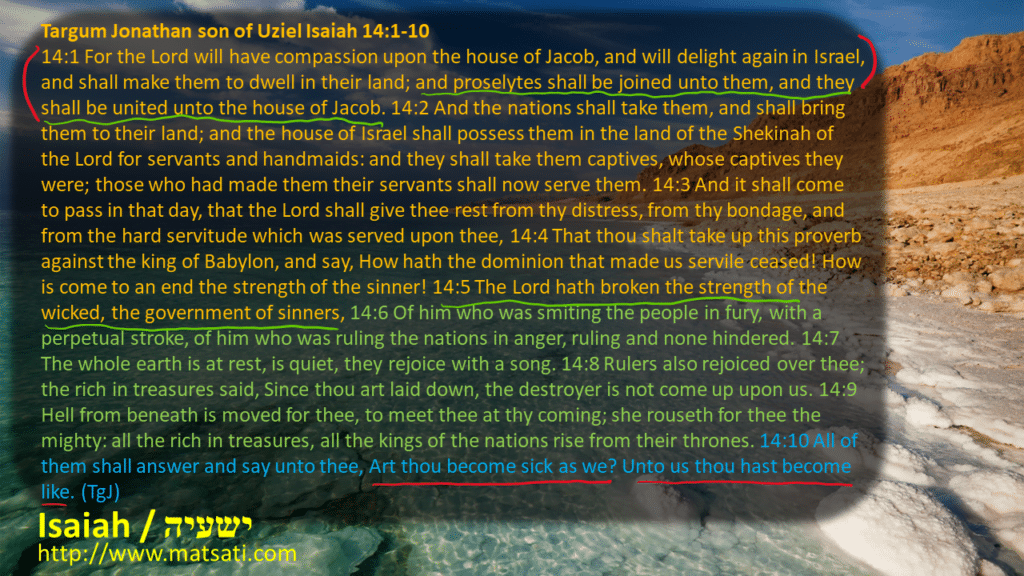
Targum Jonathan son of Uziel Isaiah 14:1-10
14:1 For the Lord will have compassion upon the house of Jacob, and will delight again in Israel, and shall make them to dwell in their land; and proselytes shall be joined unto them, and they shall be united unto the house of Jacob. 14:2 And the nations shall take them, and shall bring them to their land; and the house of Israel shall possess them in the land of the Shekinah of the Lord for servants and handmaids: and they shall take them captives, whose captives they were; those who had made them their servants shall now serve them. 14:3 And it shall come to pass in that day, that the Lord shall give thee rest from thy distress, from thy bondage, and from the hard servitude which was served upon thee, 14:4 That thou shalt take up this proverb against the king of Babylon, and say, How hath the dominion that made us servile ceased! How is come to an end the strength of the sinner! 14:5 The Lord hath broken the strength of the wicked, the government of sinners, 14:6 Of him who was smiting the people in fury, with a perpetual stroke, of him who was ruling the nations in anger, ruling and none hindered. 14:7 The whole earth is at rest, is quiet, they rejoice with a song. 14:8 Rulers also rejoiced over thee; the rich in treasures said, Since thou art laid down, the destroyer is not come up upon us. 14:9 Hell from beneath is moved for thee, to meet thee at thy coming; she rouseth for thee the mighty: all the rich in treasures, all the kings of the nations rise from their thrones. 14:10 All of them shall answer and say unto thee, Art thou become sick as we? Unto us thou hast become like. (TgJ)
The Targum describes the mercy of God upon Jacob His people, and the grand vision is to return the people to the Land of Israel, for the Holy Temple to stand on the Temple Mount in Jerusalem and for all aspects of national life to be conducted according to the teachings of the Torah in musar (ethics, morals, righteousness, and holiness). The people of Israel would thus be a light unto the nations, all of whom would come to visit Israel and receive inspiration from God for how to live just as Isaiah states, “In the last days, the mountain of the Lord’s house will be the highest of all- the most important place on earth. It will be raised above the other hills, and people from all over the world will stream there to worship. People from many nations will come and say, ‘Come, let us go up to the mountain of the Lord, to the house of Jacob’s God. There he will teach us his ways, and we will walk in his paths.’ For the Lord’s teaching will go out from Zion; his word will go out from Jerusalem.” (Isaiah 2:1-4) The present interpretation of Isaiah according to TgJ is interwoven with what was previously stated in Isaiah 2:1-4. This is the mercy of God to His people as the TgJ states, א אְרֵי יְרַחֵים יוי עַל בֵית יַעְקֹב וְיִתרְעֵי עֹוד בְיִשׂרָאֵל וְיַשרֵינוּן עַל אְרַעהֹון וְיִתֹוסְפוּן גִיֹורִין עְלֵיהֹון וְיִסתַמכוּן עַל בֵית יַעְקֹב׃ 14:1 For the Lord will have compassion upon the house of Jacob, and will delight again in Israel, and shall make them to dwell in their land; and proselytes shall be joined unto them, and they shall be united unto the house of Jacob. (TgJ) The vision here is to the entire land being inhabited by the Jew and only the non-Jew who wishes to be a part joining themselves with the God of Israel through faith and faithfulness. These non-Jews are given the unique status of the “ger toshav” a technical term for an “resident alien” who seeks the God of Israel and who joins himself with Israel. The commentaries such as Ibn Ezra on Isaiah 14:1 states “For the Lord will have mercy, etc. When Babylon was taken, Cyrus allowed the exiled Jews to return home.” This again illustrates the dual fulfillment aspect of prophecy, there being a present day fulfillment and a future expectation. Isaiah continues saying according to the Targum the following: ב וִידַבְרוּנוּנוּן עַמְמִין וְיֹובְלוּנוּנוּן לַאְתַרהֹון וְיַחסְנוּנוּנוּן בֵית יִשׂרָאֵל עַל אְרַע שְכִינְתָא דַיוי לְעַבדִין וּלאַמהָן וִיהֹון שָבַן לְשָבֵיהֹון וְיִפלְחוּן בִמשַעבְדֵיהֹון׃ 14:2 And the nations shall take them, and shall bring them to their land; and the house of Israel shall possess them in the land of the Shekinah of the Lord for servants and handmaids: and they shall take them captives, whose captives they were; those who had made them their servants shall now serve them. ג וִיהֵי בְיֹומָא דִינִיַח יוי לָך מִצַעְרָך וּמִמַרוְתָך וּמִן פוּלחָנָא קַשיָא דְאִתפְלַח בָך׃ 14:3 And it shall come to pass in that day, that the Lord shall give thee rest from thy distress, from thy bondage, and from the hard servitude which was served upon thee, ד וְתִיטֹול מַתלָא הָדֵין עָל מַלכָא דְבָבַל וְתֵימַר אֵיכְדֵין בְטֵילַת מַרוַת מְשַעבְדַנָא סָף תְקֹוף חַיָיבָא׃ 14:4 That thou shalt take up this proverb against the king of Babylon, and say, How hath the dominion that made us servile ceased! How is come to an end the strength of the sinner! ה תַבַר יוי תְקֹוף רַשִיעִין שֻלטַן חַיָיבִין׃ 14:5 The Lord hath broken the strength of the wicked, the government of sinners. (TgJ) The idea of the nations taking the people to the Land, this may be a reference to the later kings, such as Cyrus allowing the people to return to the land such as in the case of Nehemiah and the Persian king Darius who paid for Nehemiah to return to Israel and make travels back and forth. The TgJ speaks of the Lord breaking the strength of the sinner, the wicked governments, and the rod which symbolizes their power. Ibn Ezra on Isaiah 14:5 Part 1 states, “The staff. A figure signifying kingdom. The rod. The same. The king is like a shepherd, the people like his flock.” and Rashi on Isaiah 14:5 Part 1 states, “The Lord has broken the staff of the wicked For he would smite peoples with wrath.” The idea is that sin has a way to keep people in their current state and move them to greater and greater levels of depravity. The reason this is so important is found in the aspect of our being created in God’s image. Note that in the book of Vayikra / Leviticus, the root word for holy (קדוש) occurs over 150 times and the message of Leviticus is that since God is holy, we must be holy in our lives as well. Being holy means to have the ability to make a distinction between what is sacred and what is profane, the clean and the unclean, etc. (Vayikra / Leviticus 10:10) We note what the Jerusalem Talmud Megilla 1:11 states concerning these things.
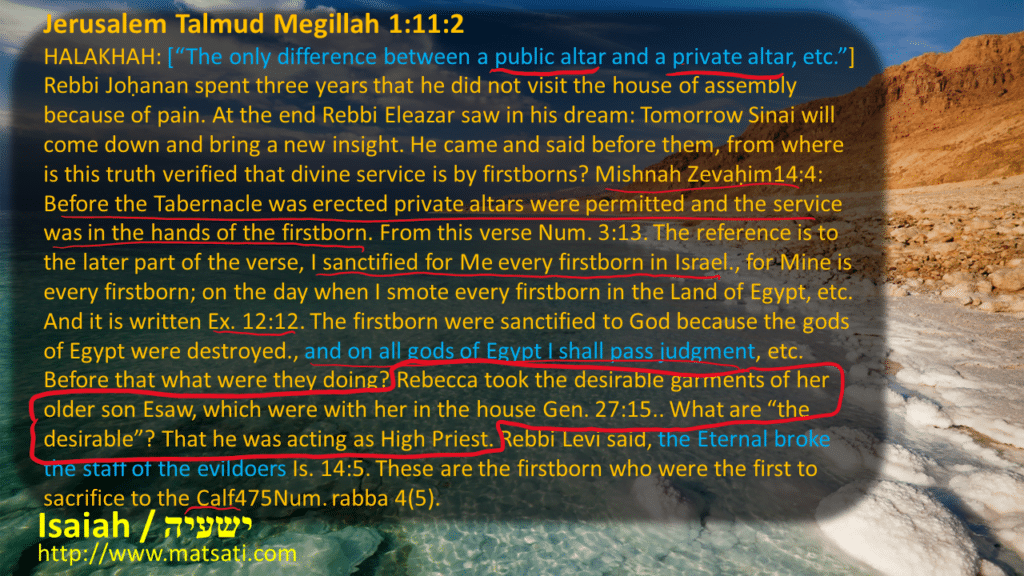
Jerusalem Talmud Megillah 1:11:2
HALAKHAH: [“The only difference between a public altar and a private altar, etc.”] Rebbi Joḥanan spent three years that he did not visit the house of assembly because of pain. At the end Rebbi Eleazar saw in his dream: Tomorrow Sinai will come down and bring a new insight. He came and said before them, from where is this truth verified that divine service is by firstborns?470Mishnah Zevaḥim14:4: Before the Tabernacle was erected private altars were permitted and the service was in the hands of the firstborn. From this verse471Num. 3:13. The reference is to the later part of the verse, I sanctified for Me every firstborn in Israel., for Mine is every firstborn; on the day when I smote every firstborn in the Land of Egypt, etc. And it is written472Ex. 12:12. The firstborn were sanctified to God because the gods of Egypt were destroyed., and on all gods of Egypt I shall pass judgment, etc. Before that what were they doing? Rebecca took the desirable garments of her older son Esaw, which were with her in the house473Gen. 27:15.. What are “the desirable”? That he was acting as High Priest. Rebbi Levi said, the Eternal broke the staff of the evildoers474Is. 14:5. These are the firstborn who were the first to sacrifice to the Calf475Num. rabba 4(5).
The Jerusalem Talmud describes the differences between a public altar and a private altar and defines this from the sense that before the Mishkhan (Tabernacle) was built, the service at the altar (private) was to be performed at the hand of the first born son. These things reveal to us the sanctity of the home and the family unit. We note that each korban (sacrifice) and each function of worship within the Mishkhan symbolizes some characteristic of the covenant between God and Israel. From this perspective, we are able to interpret the sacrificial services as dramatizations of God’s covenant relationship with His people. The Jerusalem Talmud is consistent with traditional Jewish teaching that states every home is as a small temple. The table within the home corresponds to the altar. On every Sabbath and festival, we place bread and wine before the LORD on the table. We pronounce blessings over the cup and share the wine. We pronounce a blessing over the bread, salt it, break it, and share it. These simple covenant rites have survived over 3,000 years. By partaking in the cup and the bread on Sabbath and the festivals, we reenact a covenant remembrance that originated on the altar. When we sit and eat at home together, we are eating before the Lord God Almighty, the God of Israel. These things are key for unlocking the mystery of much of the sacrificial system and provide a basis for interpreting the sacrifices and our relationship to them and to God in heaven. This is why we read according to the TgJ on Isaiah that the staff of the wicked will be broken and the Lord God is the One who will do this. We find in the NT account that Yeshua the Messiah of God came and overcame sin, death, and the grave, and lives forever! Our faith in him and what he did on our behalf brings to fulfillment these things in our lives as God our Father in heaven sends His Holy Spirit into our hearts beginning the process of sanctification as we are motivated to separate our lives from the profane and enter into the sacred. What is clear according to Vayikra / Leviticus is that the realm of the holy must be separate from the realm of the unclean and the two must never meet. (Vayikra / Leviticus 7:20-21, Bamidbar / Numbers 5:2-3) The Torah narrative is consistent with Isaiah and the need for God to end sin and wickedness in this world. The Talmud Bavli Shabbat 139a goes on saying the following:
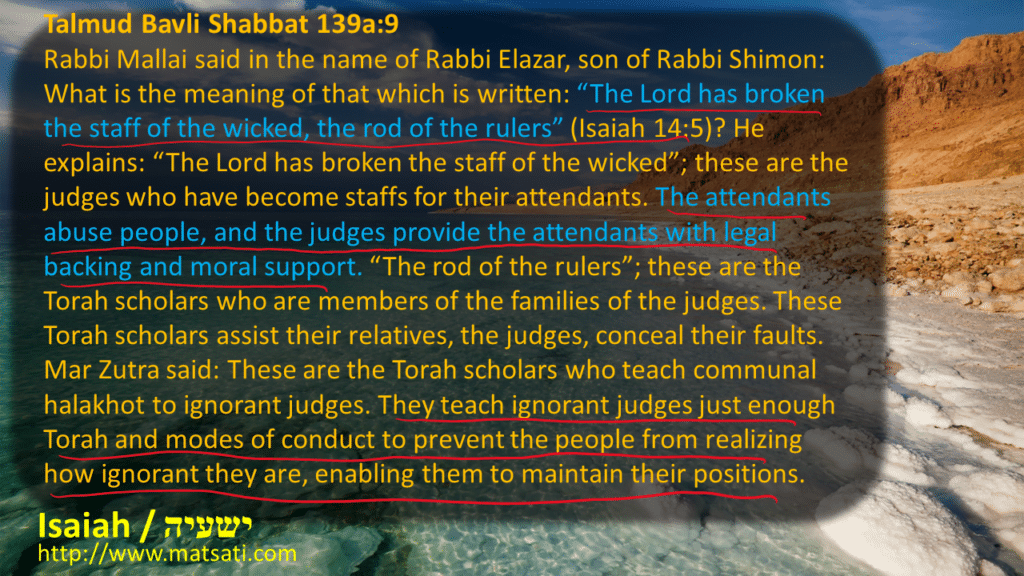
Talmud Bavli Shabbat 139a:9
Rabbi Mallai said in the name of Rabbi Elazar, son of Rabbi Shimon: What is the meaning of that which is written: “The Lord has broken the staff of the wicked, the rod of the rulers” (Isaiah 14:5)? He explains: “The Lord has broken the staff of the wicked”; these are the judges who have become staffs for their attendants. The attendants abuse people, and the judges provide the attendants with legal backing and moral support. “The rod of the rulers”; these are the Torah scholars who are members of the families of the judges. These Torah scholars assist their relatives, the judges, conceal their faults. Mar Zutra said: These are the Torah scholars who teach communal halakhot to ignorant judges. They teach ignorant judges just enough Torah and modes of conduct to prevent the people from realizing how ignorant they are, enabling them to maintain their positions.
In the Talmud Bavli, the rabbis discuss the meaning of the Lord breaking the staff of the wicked. This draws in the context of the wicked leadership over the people. Wicked leaders abuse people and the Torah is given for instruction in righteousness and holiness. The Talmud speaks of the Torah scholars teaching the people who are in authority for the purpose of acquiring a minimal knowledge so as to prevent this kind of corruption. The Talmud speaks of these judges or rulers acquiring this knowledge for the purpose so they can remain in office. This should not be the motivating factor. The idea of “just enough Torah and modes of conduct to prevent the people from realizing how ignorant they are” is not the approach one should take. The reason for studying Torah should be for our personal relationship with God and His Messiah! Seeking the Lord to work in our lives to overcome sinful behaviors, to live for His glory and so forth. This is on a personal level, which when accomplished follows through on a community level, etc. The Midrash by Ein Yaakov on Shabbat Parashat 20 Part 3 states the following concerning these things.
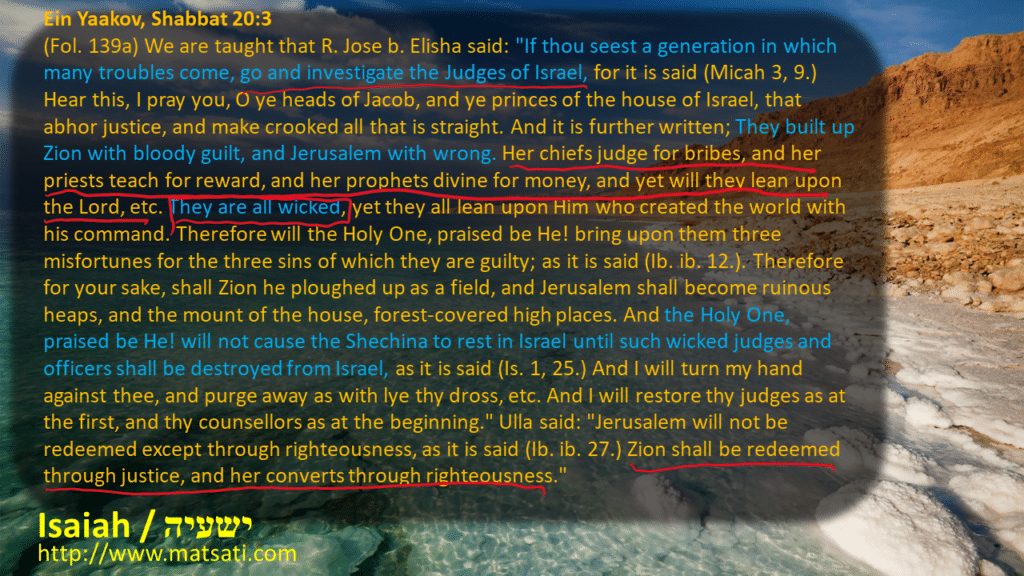
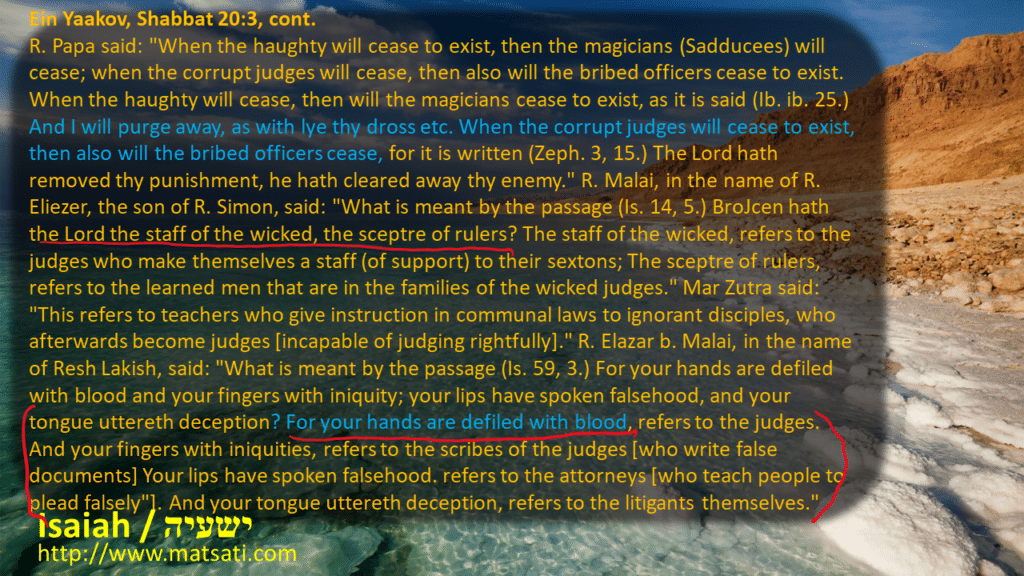
Ein Yaakov, Shabbat 20:3
(Fol. 139a) We are taught that R. Jose b. Elisha said: “If thou seest a generation in which many troubles come, go and investigate the Judges of Israel, for it is said (Micah 3, 9.) Hear this, I pray you, O ye heads of Jacob, and ye princes of the house of Israel, that abhor justice, and make crooked all that is straight. And it is further written; They built up Zion with bloody guilt, and Jerusalem with wrong. Her chiefs judge for bribes, and her priests teach for reward, and her prophets divine for money, and yet will they lean upon the Lord, etc. They are all wicked, yet they all lean upon Him who created the world with his command. Therefore will the Holy One, praised be He! bring upon them three misfortunes for the three sins of which they are guilty; as it is said (Ib. ib. 12.). Therefore for your sake, shall Zion he ploughed up as a field, and Jerusalem shall become ruinous heaps, and the mount of the house, forest-covered high places. And the Holy One, praised be He! will not cause the Shechina to rest in Israel until such wicked judges and officers shall be destroyed from Israel, as it is said (Is. 1, 25.) And I will turn my hand against thee, and purge away as with lye thy dross, etc. And I will restore thy judges as at the first, and thy counsellors as at the beginning.” Ulla said: “Jerusalem will not be redeemed except through righteousness, as it is said (Ib. ib. 27.) Zion shall be redeemed through justice, and her converts through righteousness.” R. Papa said: “When the haughty will cease to exist, then the magicians (Sadducees) will cease; when the corrupt judges will cease, then also will the bribed officers cease to exist. When the haughty will cease, then will the magicians cease to exist, as it is said (Ib. ib. 25.) And I will purge away, as with lye thy dross etc. When the corrupt judges will cease to exist, then also will the bribed officers cease, for it is written (Zeph. 3, 15.) The Lord hath removed thy punishment, he hath cleared away thy enemy.” R. Malai, in the name of R. Eliezer, the son of R. Simon, said: “What is meant by the passage (Is. 14, 5.) BroJcen hath the Lord the staff of the wicked, the sceptre of rulers? The staff of the wicked, refers to the judges who make themselves a staff (of support) to their sextons; The sceptre of rulers, refers to the learned men that are in the families of the wicked judges.” Mar Zutra said: “This refers to teachers who give instruction in communal laws to ignorant disciples, who afterwards become judges [incapable of judging rightfully].” R. Elazar b. Malai, in the name of Resh Lakish, said: “What is meant by the passage (Is. 59, 3.) For your hands are defiled with blood and your fingers with iniquity; your lips have spoken falsehood, and your tongue uttereth deception? For your hands are defiled with blood, refers to the judges. And your fingers with iniquities, refers to the scribes of the judges [who write false documents] Your lips have spoken falsehood. refers to the attorneys [who teach people to plead falsely”]. And your tongue uttereth deception, refers to the litigants themselves.”
The Midrash draws out the idea that if a generation of men is wicked, all one has to do is look at their leaders. The Prophet Micah writes:
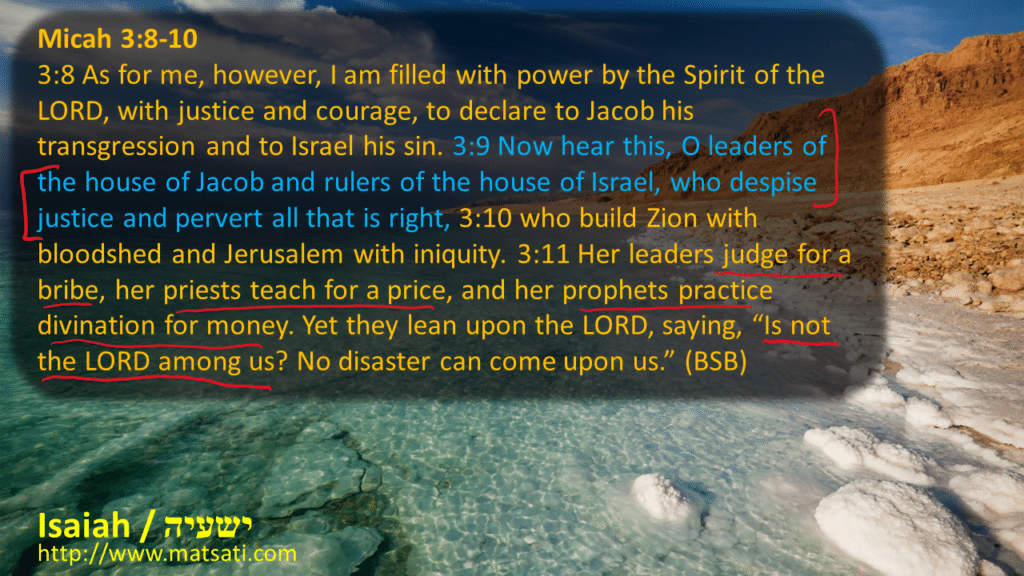
Micah 3:8-10
3:8 As for me, however, I am filled with power by the Spirit of the LORD, with justice and courage, to declare to Jacob his transgression and to Israel his sin. 3:9 Now hear this, O leaders of the house of Jacob and rulers of the house of Israel, who despise justice and pervert all that is right, 3:10 who build Zion with bloodshed and Jerusalem with iniquity. 11Her leaders judge for a bribe, her priests teach for a price, and her prophets practice divination for money. Yet they lean upon the LORD, saying, “Is not the LORD among us? No disaster can come upon us.” (BSB)
The leaders are wicked, they enable wickedness, and so the generation of men become the same. The Lord promises to purge away such people. All things happen to us for a purpose. For example, if we live in unrepentant sin, when things happen, i.e. health, financial, relationship, etc., these things are meant to wake us up and draw us back to God’s truth, to repent and turn from our sinful ways. The Major thrust of the Midrash speaks to the role of leadership in the state and condition of the people whom they rule over. Corrupt leaders are like a spreading blight on the backs of the people which corrupts. This is quite a parallel to Tzaraat. The great extent of wickedness according to the TgJ writes, ט שְאֹול מִלְרַע זַעַת לָך לְקַדָמוּת מֵיתָך אַעְרַת לָך גִיבָרִין כֹל עַתִירֵי נִכסַיָא אְקִימוּ מִכֻרסָוָתְהֹון כָל מַלכֵי עַמְמַיָא׃ 14:9 Hell from beneath is moved for thee, to meet thee at thy coming; she rouseth for thee the mighty: all the rich in treasures, all the kings of the nations rise from their thrones. (TgJ) The idea is that hell itself will move to accommodate the one who is so wicked. Rashi writes the following concerning these things:
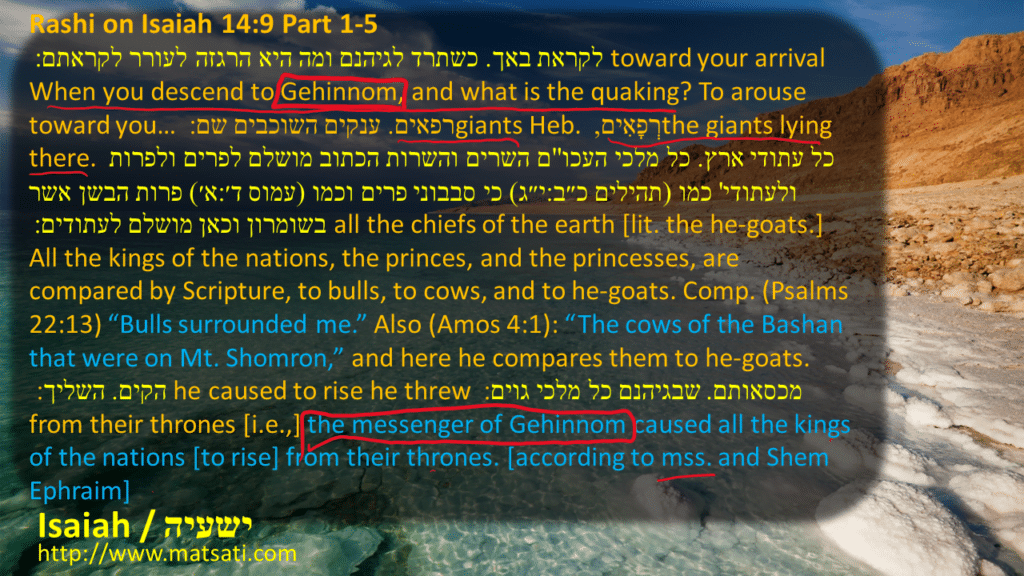
Rashi on Isaiah 14:9 Part 1-5
לקראת באך. כשתרד לגיהנם ומה היא הרגזה לעורר לקראתם: toward your arrival When you descend to Gehinnom, and what is the quaking? To arouse toward you… רפאים. ענקים השוכבים שם: giants Heb. רְפָאִים, the giants lying there. כל עתודי ארץ. כל מלכי העכו”ם השרים והשרות הכתוב מושלם לפרים ולפרות ולעתודי’ כמו (תהילים כ״ב:י״ג) כי סבבוני פרים וכמו (עמוס ד׳:א׳) פרות הבשן אשר בשומרון וכאן מושלם לעתודים: all the chiefs of the earth [lit. the he-goats.] All the kings of the nations, the princes, and the princesses, are compared by Scripture, to bulls, to cows, and to he-goats. Comp. (Psalms 22:13) “Bulls surrounded me.” Also (Amos 4:1): “The cows of the Bashan that were on Mt. Shomron,” and here he compares them to he-goats. הקים. השליך: he caused to rise he threw מכסאותם. שבגיהנם כל מלכי גוים: from their thrones [i.e.,] the messenger of Gehinnom caused all the kings of the nations [to rise] from their thrones. [according to mss. and Shem Ephraim]
The idea is when the wicked die, they descend into Gehinnom (Hell) and Hell is aroused, becoming aware of one’s arrival. Rashi speaks of the רפאים (Raphaim) the ענקים (Anakim) being there in Hell, these are the mighty men of war that are found in the Torah narrative. These men caused great fear in the people, so much so that Israel doubted God and then spent 40 years in the wilderness. Rashi provides a description of those who reside in Hell, “all the chiefs of the earth,” “the kings of the nations,” and “the princes and princess.” Note how these are described as being prideful before both God and men. In ancient Ugarit, the bull was believed to be a messenger of God. This connects us to Parashat Ki Tisa and the khet Haegel, the sin of the golden calf, and to Rashi’s conclusion that these are messengers of Gehinnom (Hell) which caused the kings of the nations to not just be deceived, but to rise from their thrones in Hell when the wicked arrives from the land of the living. The Torah warns us of these things, the dangers of living according to the flesh, where judges take bribes (Isaiah 1:23, Ezekiel 22:12), where God warns forbidding very stringently according to Shemot / Exodus 23:8 and Devarim / Deuteronomy 16:19, etc. The Torah also speaks of the Messiah, His role and purpose as a great leader, to lead His people in God’s holy ways, and to seek the God in heaven for mercies and forgiveness of sins, and most of all to overcome this world. These things are further explained according to the NT text, which speaks of Yeshua, the Messiah of God, who provides us not just access to our Father in heaven, but also to receiving the Spirit of God in our hearts such that we can have the power of God in our lives to overcome sin! These words of Isaiah are explicit warnings for us to keep our focus upon the Lord and not upon ourselves. To trust in the Lord for all things and not in men, wealth, or our possessions as these are fleeting!
